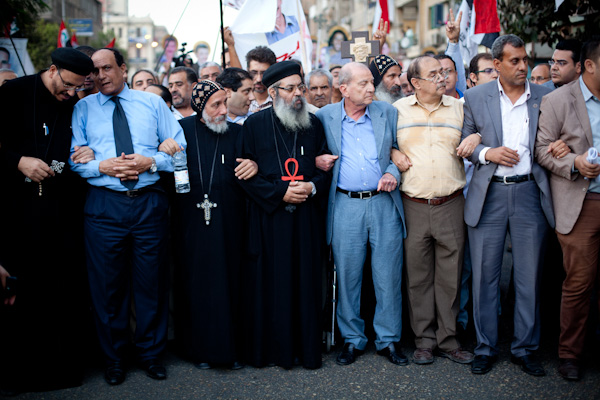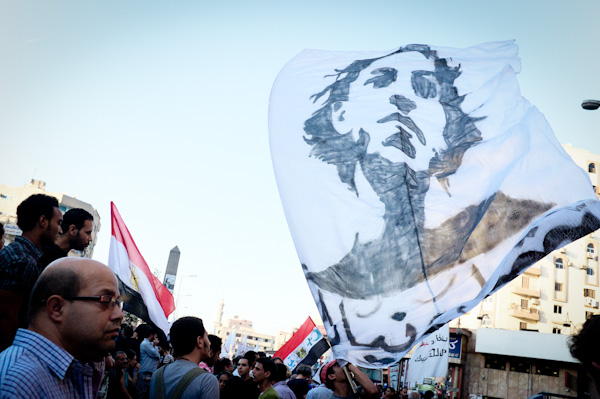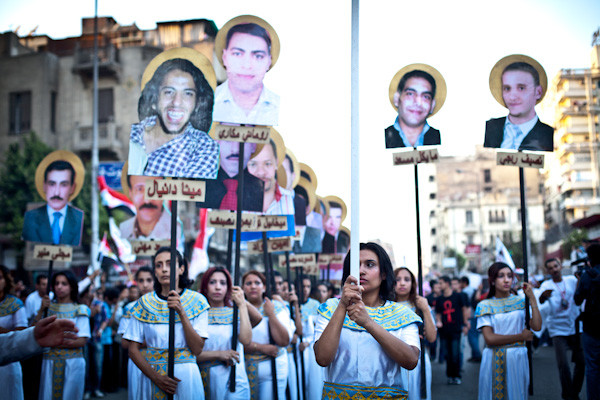Antonios Wahba went to work as a cameraman on 9 October, knowing that a Coptic demonstration would take place in front of the Maspero state television building next door. He did not, however, imagine the terror that would ensue. He definitely did not expect to be beaten by his country’s soldiers and police because he was Christian.
Military personnel along with central security and plain-clothed individuals interrupted the live news broadcast at 25 January TV, the independent station where Wahba works, at around 8 pm. The security forces were ostensibly searching for Copts they had chased away from the protests but who they thought were hiding in the building. The military was right, but luckily, they did not find the hiding protesters. “God protected them,” Wahba said.
On 9 October, 25 January TV – in operation since February 2011 – closed down after a frantic night at the station. During the live broadcast, news presenter Shereen al-Sayyad was heard screaming the words “I’m pregnant” in terror as the intruders entered.
“One of the soldiers yelled hysterically at everyone to get on the floor and show their ID’s. He cocked his gun in my direction and I fell off the platform where I stood to read the news,” Sayyad said. The channel, which is located near Maspero, had been covering the clashes.
The station is scheduled to go back on air on Thursday, 11 days after the incident. “We had to close the channel to regroup, as well as renovate in the wake of the damage done by the soldiers who raided the station,” said Mohamed Gohar, who owns the channel.
On the fringes of the Maspero massacre, many of the injured took refuge in the garage of the 25 January TV building and many of the dead were taken there, according to the station’s employees.
Wahba took a break from work to watch the protest from in front of his building. He then heard gunshots, and saw throngs of people running towards him, some with injuries. After seeing two armored vehicles charge through the masses, many of those coming back were badly injured or dead. “I counted 10 bodies in the garage of our building,” he said.
Workers in the building helped send many of the injured off. However, when word spread that the soldiers and police were going to apprehend those hiding in the garage, 17 ran into the building for refuge. Without informing a majority of his staff, Gohar decided to hide 17 – including a priest – in the backroom of one of his studios.
“I was extremely moved and hurt by the death and injuries I saw under my building. I couldn’t help but try to keep them from harm,” he said.
25 January TV prides itself on being a product of the “spirit of Tahrir,” which, among other things, means believing in equal justice for all. For Gohar, this was an opportunity to put this belief into practice, and he found no difficulty in finding help from his young staff in the potentially dangerous endeavor.
He relieved the building’s security personnel immediately, fearing that in an act of self-preservation, they would lead the soldiers to those hiding – one of whom was Muslim.
Most of the channel’s staff did not know that that their boss had made this decision. “I only learned that some protesters were hiding in our offices eight days after the fact,” said Sayyad.
According to Wahba, two soldiers barged into the studio, along with two military policemen, 10 Central Security personnel, and plain-clothed individuals armed with melee weapons.
“The soldiers were the most incensed. They waved their guns around, cursed at everyone, and broke almost anything in their path, yelling ‘our brothers are being killed down there!’” he said. Then they started checking everyone’s IDs, paying special attention to the “religion” slot on the backside of official Egyptian ID cards.
“The soldier looked at my ID, then screamed, ‘He’s Christian! Beat him up!’” Wahba said. The others accompanying the soldier joined the melee.
If it was not for the intervention of Wahba’s co-workers who came to his defense, the soldier would have taken him into custody, he believes. The intruders searched those present, but didn’t look behind a curtain in one of the studios, where a door led to the room hiding the protesters.
Throughout the night, couriers brought food back and forth to the temporary fugitives, as a handful of employees stayed behind to help. “The only good I would say that came out of that day, is to see the acts of solidarity that many of those working in the building – Muslims and Christians – showed with the Coptic protesters. As painful as it was to see, it felt like the soldiers were being specifically discriminatory against the Copts,” Gohar said.
At 7 am, as the curfew imposed for the night came to an end, the hidden protesters were smuggled out one by one out of fear they may be under surveillance. A priest was the last to leave. “He vehemently refused to change his clothing. In the end I asked him to at least leave holding a Quran, telling him it would protect him in case someone stopped him,” Gohar said.
Before they were able to relocate all 17, three army officers visited again, asking to search the premises.
“Mr. Gohar owns the building, so we were able to move those remaining to different apartments, when the three guys showed up a second time,” Wahba said.
Gohar, who founded of the media services company Video Cairo, sent a memo to the Supreme Council of the Armed Forces, to explain what happened on 9 October, and raise concerns about how the soldiers raided his studios.
“SCAF sent back a note affirming that they did not intend any attack on the station or its freedom to report,” he said. He was quick to stress that his channel was not under any orders from the military to shut down, and that the SCAF never interfered in his channel’s news coverage before.
As of Thursday, the station is back to business as usual, but maybe with a renewed sense of purpose and solidarity. “Everyone at the station stood by me in an amazing way,” Wahba said.
“No matter what, we saw the raid as an unacceptable violation of our rights, as journalists and humans.”



